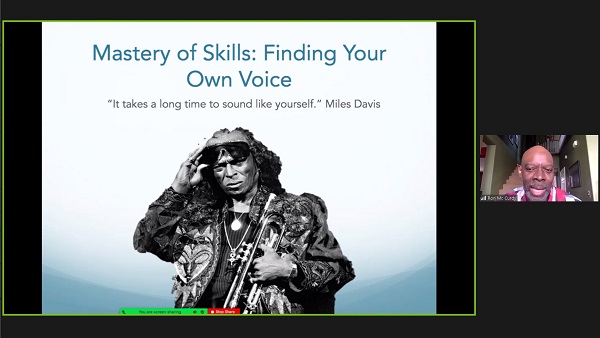University of Southern California music professor Ron McCurdy made the second appearance of his virtual residency at Harker on Feb. 26, discussing the leadership principles illustrated by a number of famous jazz bandleaders.
He began with Duke Ellington, one of the most enduring composers and bandleaders of the 20th century, who managed to stay relevant for half a century and through many drastic shifts in musical tastes. Ellington was known for composing pieces that emphasized the strengths of individual players in his band, even writing down their names on the sheet music. “That’s how intimately he understood what his musicians were capable of doing,” McCurdy said. He also reinvented himself on several occasions. “He realized that what he had done in the 1920s and 30s would not necessarily work in the 1940s,” said McCurdy, citing Ellington’s work for TV and movies, as well as what McCurdy called “art music.”
Ellington also inspired loyalty in his band members, many of whom stayed with his band for decades. “He treated them all with dignity,” McCurdy noted. “He didn’t believe in letting people go. Because of that loyalty, he was able to keep many of his key sidemen in his band.”
Moving on to Miles Davis, McCurdy noted the legendary trumpeter’s belief in the importance of finding one’s own voice, something he encouraged in the musicians who played with him. “[Davis] did not believe in … keeping the same style, playing the same music,” McCurdy said, pointing out Davis’ powerful use of notes that would be considered wrong by other players. “When you learn the theory behind it, hopefully you break the rules,” McCurdy said. “Who’s to say that playing a D natural over a minor chord is a wrong note? The ear can reconcile that sound, but theoretically it’s wrong. If you can play it with conviction, it won’t sound wrong.”
The conviction Davis displayed inspired a generation of now-legendary jazz musicians, including Chick Corea, Cannonball Adderley and Herbie Hancock. “He also trained the next generation of bandleaders,” said McCurdy. “This is the mark of a great leader; you make everyone around you better.”
Another of the leaders McCurdy discussed was drummer Art Blakey, who McCurdy called the “consummate pedagogue.” Blakey was known for keeping members for a maximum of a few years before letting them go to start their own bands and define their own careers. Everyone in Blakey’s band was expected to compose as well as perform. This was also done to keep his own work from stagnating. Blakey and his band, the Jazz Messengers, became known for the talented young performers it featured and helped codify the style that would become known as “hard bop,” which contained elements of gospel and rhythm and blues. Notable Jazz Messengers alumni include Terrence Blanchard, Freddie Hubbard and Wynton and Branford Marsalis.
